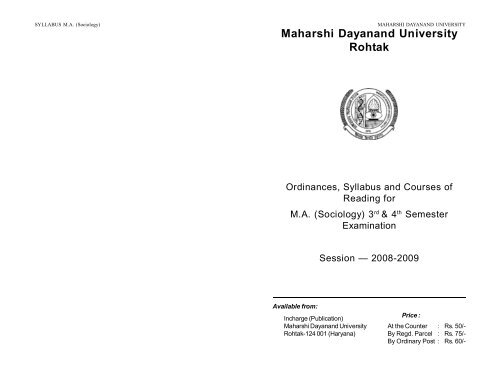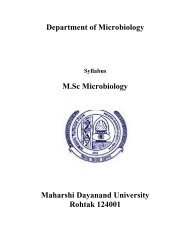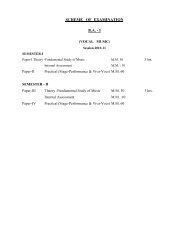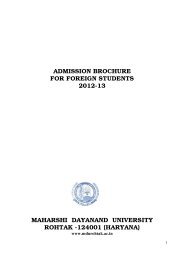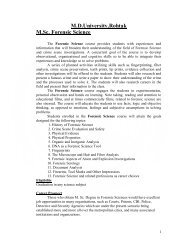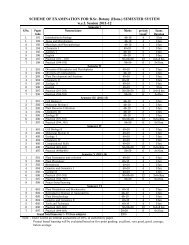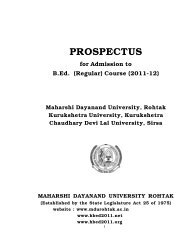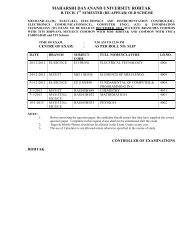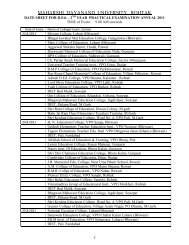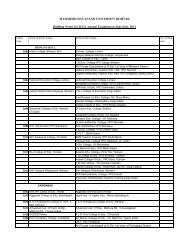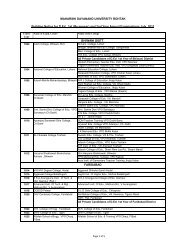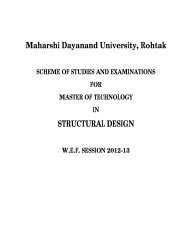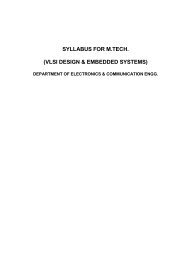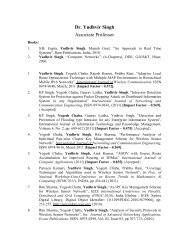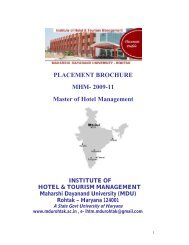Maharshi Dayanand University Rohtak
Maharshi Dayanand University Rohtak
Maharshi Dayanand University Rohtak
Create successful ePaper yourself
Turn your PDF publications into a flip-book with our unique Google optimized e-Paper software.
SYLLABUS M.A. (Sociology) MAHARSHI DAYANAND UNIVERSITY<br />
<strong>Maharshi</strong> <strong>Dayanand</strong> <strong>University</strong><br />
<strong>Rohtak</strong><br />
Ordinances, Syllabus and Courses of<br />
Reading for<br />
M.A. (Sociology) 3 rd & 4 th Semester<br />
Examination<br />
Session — 2008-2009<br />
Available from:<br />
Incharge (Publication)<br />
Price :<br />
<strong>Maharshi</strong> <strong>Dayanand</strong> <strong>University</strong> At the Counter : Rs. 50/-<br />
<strong>Rohtak</strong>-124 001 (Haryana) By Regd. Parcel : Rs. 75/-<br />
By Ordinary Post : Rs. 60/-
SYLLABUS M.A. (Sociology) 1 2<br />
MAHARSHI DAYANAND UNIVERSITY<br />
DEPARTMENT OF SOCIOLOGY<br />
SCHEMEOF EXAMINATIONS 2009-2010<br />
M.A. 3 rd and 4 th Semester 2009-2010 and onwards :-<br />
3 rd Semester<br />
Compulsory Papers<br />
Paper-11 Classical Sociology Theory 80 (Theory) +<br />
20 (Int. Asst.)=100<br />
Paper-12 Computer Applications in 60 + 40 (P)<br />
Social Research<br />
Paper-13 Rural Sociology 80 (Theory) +<br />
20 (Practical)=100<br />
Note : P stands for practical Paper<br />
Optional Papers-14<br />
Group- A<br />
Paper-14.1 Sociology of Population Studies 80 (Theory) +<br />
20 (Int. Asst.)=100<br />
Paper-14.2 Sociology of Mass Communication & Popular Culture<br />
80 (Theory) +<br />
20 (Int. Asst.)=100<br />
Paper-14.3 Sociology of Human Rights & Duties<br />
80 (Theory) +<br />
20 (Int. Asst.)=100<br />
Optional Papers-15<br />
Group- B<br />
Paper-15.1 Sociology of Environment 80 (Theory) +<br />
20 (Int. Asst.)=100<br />
Paper-15.2 Social Problems in India 80 (Theory) +<br />
20 (Int. Asst.)=100<br />
Paper-15.3 Social of Peasantry 80 (Theory) +<br />
20 (Int. Asst.)=100<br />
It is pertinent to mention here that the students will have<br />
to opt for one paper in each group respectively i.e. one from<br />
Group- A and one from Group-B from the optional papers<br />
listed above. The optional papers shall be floated at the sole<br />
discretion and convenience of the department.<br />
4 th Semester<br />
Compulsory Papers<br />
Paper-16 Social Stratification and Mobility 80 (Theory) +<br />
20 (Int. Asst.)=100<br />
Paper-17 Contemporary Sociology Theory 80 (Theory) +<br />
20 (Int. Asst.)=100<br />
Optional Papers-18<br />
Group- A<br />
Paper-18.1 Ethnicity, Pluralism and Nation 80 (Theory) +<br />
20 (Int. Asst.)=100<br />
Paper-18.2 Social Policy and Planning 80 (Theory) +<br />
20 (Int. Asst.)=100<br />
Optional Papers-19<br />
Group- B<br />
Paper-19.1 Sociology of Deviance & Crime 80 (Theory) +<br />
20 (Int. Asst.)=100<br />
Paper-19.2 Urban Sociology 80 (Theory) +<br />
20 (Int. Asst.)=100<br />
Optional Papers-20<br />
Group- C<br />
Paper-20.1 Gender & Society 80 (Theory) +<br />
20 (Int. Asst.)=100<br />
Paper-20.2 Sociol Movements 80 (Theory) +<br />
20 (Int. Asst.)=100<br />
It is pertinent to mention here that the students will have<br />
to opt for one paper in each group respectively i.e. one from<br />
Group- A and one from Group-B from the optional papers<br />
listed above. The optional papers shall be floated at the sole<br />
discretion and convenience of the department.<br />
Scheme of Examination<br />
It was decided to adopt the new scheme of exa,mination<br />
whereby all the papers shall have nits comprising of 80 marks<br />
and the internal assessment component will be that of 20<br />
marks. The detailed scheme of examination have been<br />
appended in all the compulsory as well as optional papers
SYLLABUS M.A. (Sociology) 3 4<br />
MAHARSHI DAYANAND UNIVERSITY<br />
separately. In the theory portion students will be asked to<br />
attempt four questions from the four units selecting at least<br />
on from each unit and the 5th question which shall be<br />
compulsory will be in the format of short answer type<br />
questions comprising of 5 to 6 lines each respectively. Thus<br />
the total marks for all the five questions i.e. four from the<br />
units (16x4) and the 5th compulsory shall be divided into<br />
eight short answer question of 2 marks each i.e. (8X2=16)<br />
thus making the total weigthage to 80 marks.<br />
The details of Internal Assessment system of 20 marks as<br />
has been prescribed by the <strong>University</strong> are given as below :-<br />
a) Two class tests of 5 marks each. The 1st class test<br />
will be held in the Ist half of December i.e. before<br />
winter break and 2nd shall be conducted in the 1st<br />
half of March i.e. before the commencement of<br />
examination (5+5=10).<br />
b) Assignment/term paper & presentation : 5 marks<br />
c) Attendance : 5 marks<br />
65% to 75% : 1 marks<br />
76% to 85% : 2 marks<br />
86% to 90% : 3 marks<br />
91% to 95% : 4 marks<br />
above 95% : 5 marks<br />
Note for paper "Computer Applications in Social research "<br />
3rd semester<br />
It is important to mention here that paper " Computer<br />
Applications in Social Research" in the 3 rd semster shall have<br />
the theory as well as practical component. the theory portion<br />
will be that of 60 marks and practical portion will be that of<br />
40 marks. The theory paper shall have four units with internal<br />
choice i.e. total of eight questions out of which students shall<br />
be asked to attempt four selecting one from each unit<br />
respectively. Each theory question will be that of 15 marks<br />
thus making it a total of 60 marks i.e. 15x4. the prcatical<br />
portion will be that of 40 marks. It is pertinent to mention<br />
that the practical portion of the paper " Computer Applications<br />
Social Research" shall be evaluated by the external<br />
examiner with the help of internal examiner and there will be<br />
no compulsory question in this paper.<br />
Syllabus for M.A. (Sociology) Session 2008-2009 in the<br />
Semester System<br />
M.A. Sociology Semester - III<br />
Compulsory Paper-11<br />
Classical Sociological Theory<br />
Duration of Examination : 3 Hours<br />
Max. Marks : 100<br />
Theory : 80<br />
Internal Assessment : 20<br />
Unit-I<br />
Rise of Classical Sociological Theory : Positivism : Comte's<br />
Law of three stages : Evolutionism : H.Spencer's Evolutionary<br />
Doctrine : Conflict : Marx's Dialectical Materialism<br />
Unit-II<br />
Functinal Theory : Malinowski's Functionalist Doctrine :<br />
Durkheim's Division of Labour and Parsons' Social System.<br />
Unit-III<br />
Structural Theory : A. R. Radcliffe Brown : The Concept of<br />
Social Structure : S.F. Nadel : The Problems of Role Analysis;<br />
Levi Strauss : Social Structure.<br />
Unit-IV<br />
Interactionist Theory : M. Weber : typology of Social Action :<br />
and V. Pareto's Typology of Social Conduct ; Residue and<br />
Derivations; G.H. Mead's, Mind, Self and Society.<br />
Note for Paper setting :<br />
The question paper will consist of four sections containing<br />
eight questions with internal choice from each unit i.e. two<br />
questions from unit. The candidate will be required to<br />
answer five questions in all . Four questions will have to<br />
be attempted from four units and the fifth question which<br />
is compulsory shall be in the short answer type question<br />
covering the entire syllabus. All the questions shall carry<br />
equal marks i.e. 16 each from the units and 5 th compulsory
SYLLABUS M.A. (Sociology) 5 6<br />
MAHARSHI DAYANAND UNIVERSITY<br />
quetsion shall be divided in to eight short answer question<br />
of 2 marks each i,e, 8x2=16 thus making it the total<br />
weightage to 80 marks.<br />
Readings:<br />
Adams, Bert N. & Sydie, R.A.,(2001) Sociological Theory ,<br />
New Delhi, Vistar Publications.<br />
Abraham M. Francis (2001), Modern Sociological Theory<br />
: An Introduction, Kolkata, Oxford <strong>University</strong> Press.<br />
Aron, raymond (1965), Main Currents in Sociological<br />
Throught, Vol.-I & II, New York ; Basic Books..<br />
Bottomore, Tom & Nisbet, Robert (2004), A History of<br />
Sociological Analysis, Jaipur, Rawat Publications.<br />
Cohen Percy S/.(1968) Modern Social Theory, New York,<br />
Basic Books.<br />
(1994), The Polity Reader in Social Theory, Cambridge,<br />
Polity Press.<br />
Giddens, Anthony (1996), Capitalism & Modern Sociol<br />
Theory, Cambridge, Cambridge <strong>University</strong> Press.<br />
Lemert, Charles (2004), Social Theory ; The Multicultural<br />
and Classic Readings, Jaipur, Rawat Publications.<br />
Ritzer George (2000), Modern Sociological Theory, New<br />
York, Mc Graw-Hill<br />
Ritzer George (2000), Classical Sociological Theory, New<br />
York, Mc Graw-Hill Higher Education.<br />
Turner, Jonathan H. (2001), The Structure of Sociol<br />
Theory, Jaipur, Rawat Publications.<br />
Zeitlin, Irving M, (2001), Rethinking Sociology : A Critique<br />
of Contemporary Theory, Jaipur, Rawat Publications.<br />
M.A. Sociology Semester - III<br />
Compulsory Paper-12<br />
Computer Applications in Sociol Research<br />
Duration of Examination : 3 Hours<br />
Max. Marks : 100<br />
Theory : 80<br />
Internal Assessment : 20<br />
Unit-I<br />
Computer System an overview : Histroy of Computers, Basic<br />
Applications of Computers in different fields, Characteristics of<br />
computers, Functioning of Computers, Functional Components of<br />
a Computer System, types of Computer, Benefits and Limitations<br />
of Computers, Computer virus, cyber crime.<br />
Unit-II<br />
MS Windows : Features of Windows, Getting started with<br />
Windows, managing files and folders, Basic Windows<br />
Accessories : Mouse pointer, Control panel Creating Short<br />
Cuts, Shutting down the Computer.<br />
Unit-III<br />
Introduction to MS Office and MS Excel : Creating Document,<br />
How to Type in Word, Editing Document, Formatting the<br />
Document, Spell Check, Craeting Tables, Saving the<br />
Document, Printing and closing the Document; Ms Excel<br />
Basics, Editing Cell contents, Command for Worksheet,<br />
Charts in MS Excel<br />
Unit-IV<br />
MS Power Point and internet : Steps to Powerpoint<br />
Presentation, Phyiscal Aspects of a Presentation, Creating<br />
New Presentation, Adding New Slides Adding IIustration to<br />
Slides, Creating Slide Shows, Whjat is Internet, Sending and<br />
Receiving E-Mails, Attachments Logging in.<br />
Practical :<br />
(a) Hands on Experience :
SYLLABUS M.A. (Sociology) 7 8<br />
MAHARSHI DAYANAND UNIVERSITY<br />
(i) Windows Operating System<br />
(ii) MS World<br />
(iii)MS Excel<br />
(iv)Internet<br />
(b) Viva Voce<br />
(i) Windows Operating System<br />
To test some of the following operations on file/ folder :<br />
� Create<br />
� Rename<br />
� Copy/cut/paste<br />
� Delete<br />
� Commands related to Notepad/Wordpad<br />
(ii) MS Word :<br />
A paragraph in MS incorporating some of the tools<br />
given below to tested during the examination:<br />
� Editing and Formatting text and paragraph<br />
� Page and Paragraph set up<br />
� Inserting pictures<br />
(iii) MS Power Point :<br />
A power point presentation using some of the tools<br />
given to be tested during the examination:<br />
� Editing and Formatting slides<br />
� Inserting pictures<br />
(iv) MS Excel :<br />
A problem in spreadshhet related to some of the tools<br />
given below to be tested during the examination :<br />
� Formatting cells and data<br />
� Functions and Formuale<br />
� Charts<br />
(v) Internet :<br />
� Logging in<br />
� Attachments<br />
� Receiving and Sending E-Mail<br />
Note for Paper setting :<br />
The question paper will consist of four sections containing<br />
eight questions with internal choice from each unit i.e. two<br />
questions from unit. The candidate will be required to<br />
answer four questions in all selecting on efrom each unit.<br />
All the questions carry equal marks (15x4=60).<br />
Readings:<br />
Mattelart, Armond (2003), The Information Society, New<br />
Delhi : Sage Publications.<br />
Balamurali, S. (1998), An Introduction to Computer Science,<br />
New Delhi : Vikas Publishing House.<br />
Lean and Loen (1998), Internet for Everyone, New Delhi :<br />
Vikas Publishing House.<br />
Saxena, Sanjay (1998, A First Course in Computer, New Delhi<br />
: Vikas Publishing House.<br />
Singhal, A. and E.M. Rogers (2000), India's<br />
Communications Revolution, London : Sage Publications
SYLLABUS M.A. (Sociology) 9 10<br />
MAHARSHI DAYANAND UNIVERSITY<br />
M.A. Sociology Semester - III<br />
Compulsory Paper-13<br />
Rural Sociology<br />
Duration of Examination : 3 Hours<br />
Max. Marks : 100<br />
Theory : 80<br />
Internal Assessment : 20<br />
Unit-I<br />
Introduction to Rural Socology : Origin of Rural Socioogy,<br />
Nature and Subject Matter of Rural Sociology, Importance<br />
of the Study of Rural Rural Sociology, Rural Urban<br />
Differences, Village Studies in India<br />
Unit-II<br />
Rural Social Structure : Caste and Class in Rural Set up,<br />
Inter Caste relations and Jaimani System, Changing Trends<br />
of Rural Caste Structure, Agrarian Class Structure, Rural<br />
Family and Changing pattern<br />
Unit-III<br />
Rural Economy : Land Tenure, Land reforms, Green<br />
revolution and its Impact Bonded and igrant Labourers,<br />
trends of Change in Rural Society.<br />
Unit-IV<br />
Rural Political Structure : Traditional Caste Panchayats,<br />
Panchayat before and after 73 rd Amendment, New Panchayati<br />
Raj and Empowerment of Women Emerging pattern of Rural<br />
Leadership and Functionalism.<br />
Note for Paper setting :<br />
The question paper will consist of four sections containing<br />
eight questions with internal choice from each unit i.e. two<br />
questions from unit. The candidate will be required to<br />
answer five questions in all Four questions wil have to be<br />
attempted from units and the fifth question which is<br />
compulsory shall be in the short answer type question<br />
covering the entire syllabus. All the questions shall carry<br />
equal marks i.e. 16 each from the units and 5 th compulsory<br />
quetsion shall be divided in to eight short answer question<br />
of 2 marks each i,e, 8x2=16 thus making it the total<br />
weightage to 80 marks.<br />
Readings:<br />
Ahlawat S.R. (1988), Green Revolution and Agriculture<br />
Labour, Delhi : Deep and Deep Publications.<br />
Beteille, A. (1974), Studies in Agrarian Social Structure,<br />
Delhi :Oxford <strong>University</strong> Press.<br />
Beteille, A. (1992), Essay in Comparartive Sociology,<br />
Delhi : Oxford <strong>University</strong> Press.<br />
Desai, R. (1969), Rural Sociology in India, Bombay :<br />
Popular Prakashan.<br />
Desai, R. (1979), Peasant Struggle in India, Bombay :<br />
Popular Prakashan.<br />
Darling M.L., (1978), Punjab Peasant in Prosperity and<br />
Debt, Delhi, Rana Partap Bagh.<br />
Dube S.C., (1955), Indian Village, London : Routledge and<br />
Kegan Paul.<br />
Doshi, S.L. and p.C. Jain (1999), Rural Sociology, Jaipur :<br />
Rawat Publication.<br />
Frankle Francine (1971), India's Green Revolution :<br />
Economic Gains and Political Costs, Princeton <strong>University</strong><br />
Press.<br />
Jodhka, S.S. (1995), Debt Dependence and Agrarian<br />
Change, Jaipur : Rawat Publication.<br />
Sabharwal, Desai (2002), New Technology and Agrarian<br />
Change, Delhi : Sanjay Publication.
SYLLABUS M.A. (Sociology) 11 12<br />
MAHARSHI DAYANAND UNIVERSITY<br />
Shanin Theodor(1971), Peasants and Peasant Society,<br />
London : Penguin Book.<br />
Sharma, K.L. (1997), Rural Society in India, Jaipur : Rawat<br />
Publication.<br />
Thorner, Danial and Alice, Thorner (1962), Land and Labour<br />
in India, bombay : Asia Publication.<br />
Wiser, william H. (1936),. The Hindu Jajmani System,<br />
Lucknow Publishing House, Lucknow.<br />
Optional Papers-14<br />
Group- A<br />
M.A. Sociology Semester - III<br />
Optional Papers-14.1<br />
Sociology of Population Studies<br />
Duration of Examination : 3 Hours<br />
Max. Marks : 100<br />
Theory : 80<br />
Internal Assessment : 20<br />
Unit-I<br />
Pupulation Data : Sources of Population Data : Census,<br />
Vital statics, Civil registration, Population Regsiter, Sample<br />
Surveys and National Family and Health Surveys (NFHS).<br />
Unit-II<br />
Pupulation Theories : Biological, Malthusian, Marxian and<br />
Demographic Transition Theory.<br />
Unit-III<br />
Pupulation Size, Distribution and Characteristics of<br />
India's Population : Growth of Indian Population since 1901,<br />
Age Structure, Sex Ratio, Literacy Levels, Rural -Urban<br />
Composition, Economic Participation and Religion.<br />
Unit-IV<br />
Pupulation Dynamic and control : fertility, Mortality and<br />
Migrations : Measuremnt Determinants and Consequences.<br />
Family Planning in India.<br />
Note for Paper setting :<br />
The question paper will consist of four sections containing<br />
eight questions with internal choice from each unit i.e. two<br />
questions from unit. The candidate will be required to<br />
answer five questions in all Four questions wil have to be<br />
attempted from units and the fifth question which is
SYLLABUS M.A. (Sociology) 13 14<br />
MAHARSHI DAYANAND UNIVERSITY<br />
compulsory shall be in the short answer type question<br />
covering the entire syllabus. All the questions shall carry<br />
equal marks i.e. 16 each from the units and 5 th compulsory<br />
quetsion shall be divided in to eight short answer question<br />
of 2 marks each i,e, 8x2=16 thus making it the total<br />
weightage to 80 marks.<br />
Readings:<br />
Agarwala, S.N. (1977) India's Population Problems, New<br />
Delhi.<br />
Banerjee, D (1971) Family Planning in India : A Critique,<br />
New Delhi People's Publishing House.<br />
Bhende, asha and Tara Kanitkar (19985),Principles of<br />
Population, Delhi Himalaya Publishing House.<br />
Bogue, Donald J. (1969) The Principles of Demography,<br />
N.Y. John Wiley.<br />
Bose, Ashish (1996) India's Basic Demographic<br />
Statistics, New Delhi : B. R. Pubishing Corporation.<br />
Census of India (2001) Population of India, Delhi : Authors Press.<br />
Determinants and Consequences of Population Growth<br />
- UN Publication (1973) (Later Revised Edition).<br />
Dubey, Surendra Nath (2001) Population of India , Delhi :<br />
Authors Press.<br />
Govt. of India (1997) (a) Reporoductive and Child Health<br />
Programme : Schemes for Implementation, Department<br />
of Family Welfare, Ministry of International Encyclopaedia<br />
on Population.<br />
Malthus T.R. (1986) An essay on the Principle of<br />
Population, ondon Wiliam Pickering.<br />
National Family and Health Survey (NFHS) (1994-1999).<br />
Bombay : IIPS<br />
Pachauri, Saroj (1999), Implementing a reproductive<br />
Health in India : the Beginning ,New Delhi :Population<br />
Council.<br />
Premi. M.K. (1991) India's Population : Heading Towards<br />
Billion, Delhi B.R. Publications.<br />
Premi. M.K. (2003) Social Demography : A Systematic<br />
Exposition, Delhi Jawahar Publisher.<br />
Srinivasan, K. (!996) Population Policy and<br />
Repropductive Health New Delhi Hindustan Publishing<br />
Corporation.
SYLLABUS M.A. (Sociology) 15 16<br />
MAHARSHI DAYANAND UNIVERSITY<br />
M.A. Sociology Semester - III<br />
Optional Papers-14.2<br />
Sociology of Mass Communication and Popular Culture<br />
Duration of Examination : 3 Hours<br />
Max. Marks : 100<br />
Theory : 80<br />
Internal Assessment : 20<br />
Unit-I<br />
Concept : Communication - Types and Components, Mass<br />
Communication - Meaing and Process, Mass Media -<br />
Characteristics and Functions, Popular Culture, Mass<br />
Culture and Folk Culture.<br />
Unit-II<br />
Theoretical Approaches The medium as the message<br />
(Marshall Mcluhan), The World of Hyperreality (Jean<br />
Baudrillard), Theory of Spiral of Silence (Elisabeth Noelle<br />
Neumann). Media System Dependency Theory (Malvin<br />
Defleur and Sandra Ball Rokeach).<br />
Unit-III<br />
Global Media : Role of Gobal Media in the production of<br />
Global Culture. Global Culture and india Society. Impact of<br />
Global Media Culture on Youth in Respect of values.<br />
Consumerism. Food Preferences, Fashions and<br />
Entertainments.<br />
Unit-IV<br />
Television and Popular Culture : satellite television and its<br />
impact on Youth Culture , Social significance and the impact<br />
of Popular culture reflected in Festivals, Pilgrimages and<br />
Films, commercialization of Folk culture.<br />
Note for Paper setting :<br />
The question paper will consist of four sections containing<br />
eight questions with internal choice from each unit i.e. two<br />
questions from unit. The candidate will be required to<br />
answer five questions in all Four questions wil have to be<br />
attempted from units and the fifth question which is<br />
compulsory shall be in the short answer type question<br />
covering the entire syllabus. All the questions shall carry<br />
equal marks i.e. 16 each from the units and 5 th compulsory<br />
quetsion shall be divided in to eight short answer question<br />
of 2 marks each i,e, 8x2=16 thus making it the total<br />
weightage to 80 marks.<br />
Readings:<br />
Appadurai, Arjun (1997) Modernity at large - Cultural<br />
Dimension of Globalization, New Delhi : oxford <strong>University</strong><br />
Press.<br />
Blumber J.G. and E. Kartz (1974) Mass Communication,<br />
London : Sage Publications.<br />
Bronsius, C. and M. Butcher 1999) ed. Image Journey -<br />
Audio Visual Media, S.N. (1977) India sage publications.<br />
Chauhan, Kanwar (2001), Television and social<br />
transformation, New Delhi Sarup and sons.<br />
Chauhan Kanwar (2003) Television and Teenagers - An<br />
Emerging Agent of Socialization, New Delhi : Sarup and<br />
Sons.<br />
Cusan J. and M. Gureviteh (ed.) (1991) Mass Media and<br />
society, London : Edward Arnold.<br />
Johnsons, Kirk (2000), Television and Social Change in<br />
Rural India, London : Sage Publications.<br />
Kumar, Kewl (1991) Mass Communication, Bombay : Jaiko
SYLLABUS M.A. (Sociology) 17 18<br />
MAHARSHI DAYANAND UNIVERSITY<br />
Lener, Daniel (1958) The Passing of Traditional Society,<br />
New York : Free Press.<br />
Mcquail, Dennis (1972) (ed.) Sociology of Mass<br />
Communication, London : Penguins.<br />
Mitra A. (1993) Television and Popular Culture, Delhi :<br />
Sage Publications.<br />
Redfield, Robert (1956), The Little Community and<br />
Peasant Society and Culture, Chicago : Chicago Press.<br />
Robertson, R. (1992). Globalization , Social Theory and<br />
Global Culture, London : Sage Publications.<br />
Schramn, Wilbur (1973), Mass Media and National<br />
Development New York Harper and Raw.<br />
M.A. Sociology Semester - III<br />
Optional Papers-14.3<br />
Sociology of Human Rights and Duties<br />
Duration of Examination : 3 Hours<br />
Max. Marks : 100<br />
Theory : 80<br />
Internal Assessment : 20<br />
Unit-I<br />
Concept : Evolution and History of Human Rights, Rights :<br />
Inherent, Inalienable Universal, Indivisible; Values: Dignity,<br />
Liberty, Equality, Justice, Theories of Human Rights : Natural<br />
Rights Theory,Positivist Theory, Marxist Theory Sociological<br />
Theory.<br />
Unit-II<br />
(A) International and National Human Rights Agencies : U.N.<br />
System : UN agencies, Economic and Social Council, UN<br />
Commission for Human Rights. (B) National Human Rights<br />
Commission (C) Declaration and Convention on human<br />
Rights : (i) Universal Declaration of Human Rights (ii) Civil<br />
and Political Rights, Economc, Social and Cultural Rights,<br />
rights of women (CEADAW), Rights of the Child.<br />
Unit-III<br />
Indian Constitution and Human Rights (i) Fundamental Rights<br />
(ii) Directive Principles of State Policy (iii) Fundamental<br />
Duties (iv) Human Rights Movements in india.<br />
Unit-IV<br />
Enforcement of Human Rights :(A) Indian Constitution, (ii)<br />
Role of Judiciary, (iii) National Human Rights Commission,<br />
(iv) Non-Governmental Organisations and (v) Human Rights<br />
Education.
SYLLABUS M.A. (Sociology) 19 20<br />
MAHARSHI DAYANAND UNIVERSITY<br />
Note for Paper setting :<br />
The question paper will consist of four sections containing<br />
eight questions with internal choice from each unit i.e. two<br />
questions from unit. The candidate will be required to<br />
answer five questions in all Four questions wil have to be<br />
attempted from units and the fifth question which is<br />
compulsory shall be in the short answer type question<br />
covering the entire syllabus. All the questions shall carry<br />
equal marks i.e. 16 each from the units and 5 th compulsory<br />
quetsion shall be divided in to eight short answer question<br />
of 2 marks each i,e, 8x2=16 thus making it the total<br />
weightage to 80 marks.<br />
Readings:<br />
Abdularahim et. al. (Ed.) (1999)Perspective on Human<br />
Rights, Manak Publications Pvt. Ltd. New Delhi.<br />
Alam, SAftab (Ed.) (1999) Human Rights in India : Issus and<br />
Challenges, New Delhi.<br />
Begum S.M.(2000) Human Rights in India : Issues and<br />
perspective New Delhi : APH Publishing Co.<br />
Bhalla, S.L. (1991) Human Rights : An Instrumental<br />
Framework for Implementation, Doctashelo, New Delhi.<br />
Cranston, Manrice (1973) What are Human Rights ? London<br />
: Badley Head.<br />
Desai, A. R. (e.) (1986) Violation of Democratic Rights in<br />
India, Bombay Popular Parkashan.<br />
Eide Asobjrn, Krause Catarina and Rosar Susan (1995)<br />
Ecoomic, Social and Cultural Rights, A Text Book, London :<br />
Martinus Mijhost Publishers.<br />
Iyer V.R. Krishna (1996) Human Rights and Inhuman Wrongs,<br />
New Delhi D.K. Publication.<br />
Kasmi, Farid (1987) Human Rights : Myth and Realty, New<br />
Delhi : Institutional Publishers.<br />
Madsen, Stig Zoft (1996) State Society and Human Rights in<br />
South Asia New Delhi.<br />
Ministry of Welfare India (1988) Marches Ahead Towards<br />
Greater Attainment of Human Rights, New Delhi.<br />
Mumtraj Ali Khan (1996) Human Rights and the Dalits, New<br />
Delhi D.K. Publishers.<br />
Rachna Kaushl (2000) Women and Hman Rights in India,<br />
New Delhi : Kaveri Books.<br />
Sqmonides Jannsz (Ed) (2003) new Dimensions and<br />
Challenges for Human Rights, Rawat Publication Jaipur.<br />
Tomalvski, Kararina (1995) Women and Human Rights, Women<br />
and World Development Science, London : Zed Books.<br />
U.N. Centre for Human Rights (1987) Human Rights<br />
Machinery, Gravia : World campaign or Human Rights.<br />
United Nations (1988) Human Rights : A Complication of<br />
International Instrumental, New York : United Nation.<br />
Waidson, Jeremy (1990) Theories of Rights, New York<br />
:Oxford <strong>University</strong> Press.
SYLLABUS M.A. (Sociology) 21 22<br />
MAHARSHI DAYANAND UNIVERSITY<br />
Optional Papers-15<br />
Group-B<br />
M.A. Sociology Semester - III<br />
Optional Papers-15.1<br />
Sociology of Environment<br />
Duration of Examination : 3 Hours<br />
Max. Marks : 100<br />
Theory : 80<br />
Internal Assessment : 20<br />
Unit-I<br />
Environment and its concepts :- Eco-system, Ecology,<br />
Environment; Environment and Society - their Interrelations<br />
Unit-II<br />
Theoretical Approches : Sustainable Development,<br />
Contributions of Contemporary Thinkers : Ramchander Guha,<br />
radha Kamal Mukherjee and Feminists.<br />
Unit-III<br />
Environment and Development : Technology, Industrialization<br />
an Development, Urbanization and Problems of Pollution and<br />
Slums; Global efforts for Resource Conservation,<br />
Environmental Consciousness and Movements : greenpeace<br />
Movement, Chipko, Sardar Sarovar and Tehri Dam.<br />
Unit-IV<br />
Contemporary Environmental Issues : water, Foorest,<br />
Sanitation, Urban Waste, Industrail pollution, Global warming,<br />
Environmental Degradation, Displacemnt and Rehabilitation<br />
of Indigenous People, Environmental Legislation and the<br />
Role of NGOs.<br />
Note for Paper setting :<br />
The question paper will consist of four sections containing<br />
eight questions with internal choice from each unit i.e. two<br />
questions from unit. The candidate will be required to<br />
answer five questions in all Four questions wil have to be<br />
attempted from units and the fifth question which is<br />
compulsory shall be in the short answer type question<br />
covering the entire syllabus. All the questions shall carry<br />
equal marks i.e. 16 each from the units and 5 th compulsory<br />
quetsion shall be divided in to eight short answer question<br />
of 2 marks each i,e, 8x2=16 thus making it the total<br />
weightage to 80 marks.<br />
Readings:<br />
Agawal, Anil (1989) " Economy and Environment in India" In<br />
Anil Aggarwal (ed) The Price of Forests, New Delhi : Centre<br />
for Science and Environment.<br />
Baviskar, Amita (1985) In the Valley of the River : Tribal<br />
Conflict over Development in the Narmada Valley, Delhi :<br />
OUP<br />
Benton, tecd (1993) Natural Relations, London : Verso.<br />
Bhatt, Anil (1989) development and Social Justice : Micro<br />
Action by Weaker Section, Sage : New Delhi.<br />
Burman, B.K. Roy (1982) report of Committee on Forest and<br />
Tribals in India New Delhi : Government of India Ministry of<br />
Home Affairs.<br />
Chauhan, I.S. (1998) Environmental Degradation, delhi :<br />
Rawat Publications.<br />
Desh Bandhu and Garg R.K. (eds.) (1986) Social Forestry<br />
and Tribal developmenta, dehradun : Natraj Publishers.<br />
Dickens Peter (1992) Society and Nature : Towards a Green<br />
Social Theory Hermel - Hemsteed : Hawester Wheatsheaf.<br />
Dobson A (1990), Green Political Thought, London : Andre<br />
Dentsch.
SYLLABUS M.A. (Sociology) 23 24<br />
MAHARSHI DAYANAND UNIVERSITY<br />
Dubey, S.M. and Murdina, Ratno (ed) (1980), Land<br />
Alienation and Restoration in Tribal Communities in India,<br />
Bombay : Himalaya Publishing House.<br />
Fernandes, Walter (1989) Tribles and Forests. New Delhi :<br />
Indian Social Institute.<br />
Gadgil, Madhav & Ram Chandra. Guha (1996), Ecology and<br />
Equity : the use and Abuse of Nature in contemporary India<br />
: New Delhi : OUP<br />
Ghai, Dhram (ed.) (1994) Development and Environment :<br />
Sustaining People and Nature UNRISD : Blackwell<br />
Publication.<br />
Giddens, Anthony (1996), Global Problems and Ecological<br />
Crisis", 2 nd edition New York : W.W. Norton and Co.<br />
Guha, Ramechandra (1995) The Unquiet Woods : Ecological<br />
Change and Peasant Resistance in the Himalaya. OUP :<br />
Delhi.<br />
Jodha, N.C. (1986) " Common Property Resources and the<br />
Rural Pool" Economic and Political weekly, 21 (27) July.<br />
Kanwar, J.S.(ed.) (1988) Water Management : The key to<br />
developing Agriculture, New Delhi, Agriole.<br />
Katyal, Jimmy and M.Satake (1989), Environmental Pollution,<br />
New Delhi : Anmol Publications.<br />
Krishna, Sumi (1996), Environmental Politics : People's lives<br />
and Development Choices, New Delhi : Sage Publications.<br />
Mehta S.R. (ed.) (1997) Poverty, Popultion and Sustainable<br />
Development New Delhi : TRawat Publications.<br />
Munshi, Indra (2000) " Environment" in Sociological Theory"<br />
Soiological Bulletin, Vol 49 No.2<br />
Plumwood, Val (1992), Gender and Ecology : Feminism and<br />
Making of Nature London : Routledge.<br />
Ramana D.V. (1980), An Overview of Environment and<br />
devleopment Asia and the Pa cific,bangkok : UNAPDI<br />
Schnaiberg, Allan (1980) The Environment New York : OUP<br />
Shiva, Vandana (1988) Staying Alive : Women, Ecology and<br />
the Environment, London Zed Books.<br />
Shiva Vandana (1991) Ecology and the Politics of Survival :<br />
Conflcits aover Natural resorces in India. New Delgi : Sage<br />
Publications.<br />
Singh Gian (1991) Environmental Deterioration in India :<br />
Causes and Control,New delhi : Agricole.<br />
Sontheimer, Sally (ed) (1991), women and Environment : A<br />
Reader Crisis and Development in The Third World London,<br />
Earthscan Publications.<br />
UNDP(1987) Sustainable Development : World commission<br />
On Environment and Development Our Common Future<br />
Brutland report,OUP New Delhi.<br />
Wilson, Des (ed) (1984) The Environmental Crisis, London :<br />
Heinemann.
SYLLABUS M.A. (Sociology) 25 26<br />
MAHARSHI DAYANAND UNIVERSITY<br />
M.A. Sociology Semester - III<br />
Optional Papers-15.2<br />
Sociology of Environment<br />
Duration of Examination : 3 Hours<br />
Max. Marks : 100<br />
Theory : 80<br />
Internal Assessment : 20<br />
Unit-I<br />
Conceptual Issues : Meaning Nature Characteristics and<br />
Types of Social Problems, Anomie and Allenation.<br />
Unit-II<br />
Theories of Social Problems : Social Disorganization<br />
Approach, Value Conflict approach, Cultural Lag approach<br />
and Labelling Theory.<br />
Unit-III<br />
Social Tensions : Castism, Communalism, Regionalism,<br />
Terrorism and Corruption.<br />
Unit-IV<br />
Social Problems and Legislations : Poverty, Dowry, Divorce,<br />
Unemployment, Environmental Pollution, Consumer<br />
Protection Act, Health Problems and Problems of Elderly.<br />
Note for Paper setting :<br />
The question paper will consist of four sections containing<br />
eight questions with internal choice from each unit i.e. two<br />
questions from unit. The candidate will be required to<br />
answer five questions in all Four questions wil have to be<br />
attempted from units and the fifth question which is<br />
compulsory shall be in the short answer type question<br />
covering the entire syllabus. All the questions shall carry<br />
equal marks i.e. 16 each from the units and 5 th compulsory<br />
quetsion shall be divided in to eight short answer question<br />
of 2 marks each i,e, 8x2=16 thus making it the total<br />
weightage to 80 marks.<br />
Readings:<br />
Ahuja Ram (1992), Social Problems in India, Rawat<br />
Publications, Jaipur<br />
Ghurye G.S. (1968) Social tensions in India bombay : Popular<br />
Parkashan.<br />
Gill S.S. (1998) The Pathology of Corruption New Delhi :<br />
Harper Collin Publisher<br />
Merton R.K. (1972) Social Theory and Social structure New<br />
Delhi Emrid Publsihing Company.<br />
Mamoria C.B. (1981) Social problems in India, Kitab Mehal<br />
Allahabad.<br />
Madan G.K. (1973) Social Problems, Allied Publications,<br />
Bombay<br />
Moneterio, J.P. (1966) Corruption : Control of maladministartion,<br />
boimbay : Mankatalss.<br />
Punit A.E. (1982) Profiles of poverty in India delhi B.R.<br />
Publishing Corporation.<br />
Randhwa, M.S. (1991) The Rural and Urban Ages, New Delhi<br />
National book Organization House.<br />
Sethna M.J. (1966) Socio legal Aspects of Anti-social<br />
behaviour, Bombay N.M. tripathi Pvt. Ltd.<br />
Singh Tarlok (1969) Poverty and Social Change Bombay<br />
Orient Longman.<br />
Srinivas. M.N. (1972) Social Change in Modern India, New<br />
Delhi, Orient Longman.
SYLLABUS M.A. (Sociology) 27 28<br />
MAHARSHI DAYANAND UNIVERSITY<br />
M.A. Sociology Semester - III<br />
Optional Papers-15.3<br />
Sociology of Peasantry<br />
Duration of Examination : 3 Hours<br />
Max. Marks : 100<br />
Theory : 80<br />
Internal Assessment : 20<br />
Unit-I<br />
Conceptualizing Peasants, Definition of Peasant society,<br />
Peasantly and class formation in India.<br />
Unit-II<br />
Agrarian crisis ; marginalization, depeasantization and<br />
peasant suicide in India.Peasantry as dominant political force<br />
in India; debate.<br />
Unit-III<br />
Mode of production debate in India Agriculture, Globalisation<br />
and its impact on peasantry.<br />
Unit-IV<br />
Peasant Movements in India ; Tebhaga Movement, telangana<br />
peasant insurrection.Naxalbari movemnt Farmer's<br />
movements and the issues involved in Shetkr and BKU.<br />
Note for Paper setting :<br />
The question paper will consist of four sections containing<br />
eight questions with internal choice from each unit i.e. two<br />
questions from unit. The candidate will be required to<br />
answer five questions in all Four questions wil have to be<br />
attempted from units and the fifth question which is<br />
compulsory shall be in the short answer type question<br />
covering the entire syllabus. All the questions shall carry<br />
equal marks i.e. 16 each from the units and 5 th compulsory<br />
quetsion shall be divided in to eight short answer question<br />
of 2 marks each i,e, 8x2=16 thus making it the total<br />
weightage to 80 marks.<br />
Readings:<br />
Brass, Tom (ed.) (1995) ew Farmers Movements in India,<br />
Frankcass, U.S.A.<br />
Beteille Andre; (1980), Six Essays in Comparative Sociology.<br />
Darling, Malcolm; (1925), The Punjab Peasant in Prosperity<br />
and Debt, South Asia Books, Columbia.<br />
Dhanagare, D.N; (1983), Peasant Movement in India, Oxford<br />
<strong>University</strong> Press.<br />
Desai, A.R. (ed); (1986), Agrarian Struggle in India after<br />
Independence. Oxford <strong>University</strong> press.<br />
Rao, M.S.A.; (1979), Social Movements in India, Manohar<br />
Publishers, Delhi.<br />
Shanin, T (ed.) (1971), Peasant and peasant societies,<br />
Penguin bok ltd, Harmondworth.<br />
Shah, T (ed.) (1971), Social movements in India, Manohar<br />
Publishers, Delhi.<br />
Sociology of Agrarian Crisis : Peasant Suicide and Emerging<br />
Challenges; Man and Development, Vol. 25, NO3,<br />
September, 2003, PP 97-110.<br />
Wolf, E.R., (1966) Peasants, Prentice Hall inc.
SYLLABUS M.A. (Sociology) 29 30<br />
MAHARSHI DAYANAND UNIVERSITY<br />
M.A. Sociology Semester - IV<br />
Optional Papers-16<br />
Social Stratification and Mobility<br />
Duration of Examination : 3 Hours<br />
Max. Marks : 100<br />
Theory : 80<br />
Internal Assessment : 20<br />
Unit-I<br />
Concepts & Meaning : Social Stratification; Social<br />
Differentiation; Hierarchy Inequality.<br />
Unit-II<br />
Forms of Social Stratification : Caste, Class, Power, Gender,<br />
Ethnicity.<br />
Unit-III<br />
Theories of Social Stratification : Functional Theory-Davis<br />
and Moore, Parsons. Conflict Theory- Marx, Dahrendoft,<br />
Multimensional - Weber, Parkin.<br />
Unit-IV<br />
Social Mobility : Nature, and Types of Social Mobility. Factors<br />
of Social Mobility, Mobility within Caste and Class.<br />
Emergence of Middle Class.<br />
Note for Paper setting :<br />
The question paper will consist of four sections containing<br />
eight questions with internal choice from each unit i.e. two<br />
questions from unit. The candidate will be required to<br />
answer five questions in all Four questions wil have to be<br />
attempted from units and the fifth question which is<br />
compulsory shall be in the short answer type question<br />
covering the entire syllabus. All the questions shall carry<br />
equal marks i.e. 16 each from the units and 5 th compulsory<br />
quetsion shall be divided in to eight short answer question<br />
of 2 marks each i,e, 8x2=16 thus making it the total<br />
weightage to 80 marks.<br />
Readings:<br />
Bendix and Lipset (1976), Class Status and Power, Routledge<br />
and Kegen Paul, London.<br />
Beteille Andre; (1969), Social Inequility, Penguin Book.<br />
Chauhan, S.K. (1980), Caste Status and Power, Classical<br />
Publishing Company, New Delhi.<br />
Dumont, Louis (1970), Homo Hierarchicus - The Caste<br />
System and its Implications, Vikas Publications, New Delhi.<br />
Gupta, Dipankar (1992), Social Stratification, Oxford<br />
<strong>University</strong>, Press, Delhi.<br />
Haralambus, M. (1981) Sociology- Themes and perspectives,<br />
Oxford <strong>University</strong> Press, Delhi.<br />
Saunders, P. (1990), Social Class and Stratification,<br />
Routledge and Kegen Paul, London.<br />
Singh, Y. (1983), Moderanization of Indian Tradition, Rawat<br />
Publications, Jaipur.<br />
Sharma, K.L. (1986), Essays on Social Stratification, Rawat<br />
Publications, Jaipur.<br />
Tumin, M.M. (1978), Social Stratification, Prentice Hall.
SYLLABUS M.A. (Sociology) 31 32<br />
MAHARSHI DAYANAND UNIVERSITY<br />
M.A. Sociology Semester - IV<br />
Optional Papers-17<br />
Contemporary Sociology Theory<br />
Duration of Examination : 3 Hours<br />
Max. Marks : 100<br />
Theory : 80<br />
Internal Assessment : 20<br />
Unit-I<br />
Levels of Theorisation in Sociology : Its origin and<br />
Contemporary Status : Merton's Scheme of Theorization :<br />
Conflict Approach ; Daherendof's Class and Class Conflict<br />
and Coser's Functions of Social Conflict.<br />
Unit-II<br />
Phenomenlogical and Ethnomethodological Theory : Alferd<br />
Shutz's, Concept of Life World ; Peter Berger and<br />
Luchmann's Social Construction of Reality; Garfinkel's Ethno<br />
methodology and Goffman's Dramaturgical Approach.<br />
Unit-III<br />
Neo-Functional and Neo-Marxist Theory : J. Alexander's Neo-<br />
Functional Approach ; Habermas's Legitimation Theory ;<br />
Louis Althusser's idea of Marxist structuralism and Gramsci's<br />
Notion of Hegemony.<br />
Unit-IV<br />
Structural and Post Modernist Theory : Gidden's<br />
Structuration Theory, Derrida's Deconstructionist Approach<br />
and Foucault's Post Modernist Theory.<br />
Note for Paper setting :<br />
The question paper will consist of four sections containing<br />
eight questions with internal choice from each unit i.e. two<br />
questions from unit. The candidate will be required to<br />
answer five questions in all Four questions wil have to be<br />
attempted from units and the fifth question which is<br />
compulsory shall be in the short answer type question<br />
covering the entire syllabus. All the questions shall carry<br />
equal marks i.e. 16 each from the units and 5 th compulsory<br />
quetsion shall be divided in to eight short answer question<br />
of 2 marks each i,e, 8x2=16 thus making it the total<br />
weightage to 80 marks.<br />
Readings:<br />
Abraham (2001), M.Francls : Modern Sociological Theory :<br />
An introductoin, Kolkata, Oxford <strong>University</strong> Press.<br />
Aron, Raymond (1965), Main Currents in Sociological<br />
Thought, Vol. I & II, New York : Basic Books.<br />
Bottomore, Tom & Nisbet, Robert (2004), A History of<br />
Sociological Analysis, JAipur, Rawat Publications.<br />
Cohen. Percy S. (1968), Modern Social Theory, New York,<br />
Basic Press.<br />
(1994), The Polity Reader in Social Theory, Cambridge, Polity<br />
Press.<br />
Giddens, Anthony (1996), Capitalism & Modern Social Theory<br />
Cambridge, Cambridge <strong>University</strong> Press.<br />
Lemert, Charles (2004), Social Theory : The Multicultural<br />
and classic readings, Jaipur, Rawat Publications.<br />
Ritzer George (2000), Modern Sociological Theory, New York,<br />
Mc Graw-Hill.<br />
Turner, Jonathan H. (2001), The Structure of Social Theory,<br />
Jaipur, Rawat Publications.<br />
Ritzer, George (2000), Classical Sociological Theory, New<br />
York Mcgraw-Hill Higher Education.<br />
Zeitlin, IrvingM, (2001), Rethinking Sociology : A critique of<br />
Contemporary Theory, Jaipur, Rawat Publications.
SYLLABUS M.A. (Sociology) 33 34<br />
MAHARSHI DAYANAND UNIVERSITY<br />
Optional Papers-18<br />
Group - A<br />
M.A. Sociology Semester - IV<br />
Optional Papers-18.1<br />
Ethnicity, Pluralism and Nation<br />
Duration of Examination : 3 Hours<br />
Max. Marks : 100<br />
Theory : 80<br />
Internal Assessment : 20<br />
Unit-I<br />
Conceptual Dimensions : Formation of Ethic Groups,<br />
Ethnicity, Ethnic identity, Ethnonationalism, Ethnic<br />
Movements and Majority – Minority Relations.<br />
Unit-II<br />
Emergence of Nation-States : Historical and Social<br />
background of the Emergence of Nations; Nations and Nation<br />
-State; Nationalism and Ethnicity.<br />
Unit-III<br />
Nature of Ethnic Conflicts : Colonialism and the emergence<br />
of Ethnic Conflicts in India, Notion of Region, Religion,<br />
Economy and Polity as Factors in Ethnic Conflict.<br />
Unit-IV<br />
Contemporary Perspective : Pluralism and Pluralistic<br />
Societies, Marginal and Marginality ; Ethnic Groups and<br />
Communities in India.<br />
Note for Paper setting :<br />
The question paper will consist of four sections containing<br />
eight questions with internal choice from each unit i.e. two<br />
questions from unit. The candidate will be required to<br />
answer five questions in all Four questions wil have to be<br />
attempted from units and the fifth question which is<br />
compulsory shall be in the short answer type question<br />
covering the entire syllabus. All the questions shall carry<br />
equal marks i.e. 16 each from the units and 5 th compulsory<br />
quetsion shall be divided in to eight short answer question<br />
of 2 marks each i,e, 8x2=16 thus making it the total<br />
weightage to 80 marks.<br />
Readings:<br />
Anderson, B. (1983), Imagined Communities : Reflections<br />
on the Origin and Spread of Nationalism, London, Verso.<br />
Bhargava, Rajiv, A.K. Bagchi and R. Sudarshan (eds) (1999),<br />
Multiculturalism, Liberalism and Democracy, Delhi; OUP<br />
Brass, Paul (1974). Ethnicity and Nationalism : Theory and<br />
Comparison, New Delhi, Sage Publications.<br />
Calhaun, Craig (1997), Nationalism,. Buckingham : Open<br />
<strong>University</strong> Press.<br />
Kedourie.E (2000), Natioanlism, (4 th ed.) London : Oxford<br />
<strong>University</strong><br />
Miller.D. (2000), Citizenship and National Identity, Cambridge<br />
: Polity Press.<br />
Oommen. T.K. (1997), Citizenship, Nationality and Ethnicity<br />
Cambridge : polity Press.<br />
Parekh, Bhikhu (2000), Rethinking Multiculturalism, London,<br />
Macmillan.<br />
Phadnis, U. (1990), Ethnicity and Nation Building in South<br />
Asia. New Delhi, Sage.<br />
Sharma S.L. and T.K. Oommen (eds). (2000), National and<br />
National Identity in South Asia. Delhi : Orient Longman.<br />
Smith, Anthony (1986), The Ethnic Origins of Nations. Oxford<br />
: Blackwell.
SYLLABUS M.A. (Sociology) 35 36<br />
MAHARSHI DAYANAND UNIVERSITY<br />
M.A. Sociology Semester - IV<br />
Optional Papers-18.2<br />
Social Policy and Planning<br />
Duration of Examination : 3 Hours<br />
Max. Marks : 100<br />
Theory : 80<br />
Internal Assessment : 20<br />
Unit-I<br />
Concept : Relationship between Social Policy and Social<br />
Development, Values underlying Social policy and Planning,<br />
Evolution of Social Policy of India.<br />
Unit-II<br />
Approaches to Social Policy – United, Integrated and<br />
Sectoral, Precesses of Social Policy, Formulation, Role of<br />
Research and Interest Groups in Policy Formulation.<br />
Unit-III<br />
Planning : Concept, Scope, Linkage Between Social Policy<br />
and Planning, Planning as an Instrument and Source of Social<br />
Policy, Role of ideology Indian Planning in a Historical<br />
perspective, Constitutional position of Planning in India,<br />
Legal Status of Planning Commission.<br />
Unit-IV<br />
Policies and their Implementation : Policies Concerning Social<br />
Welfare : Education, Health, Women, Children Population<br />
and Family Welfare, Environment and Poverty elevation.<br />
Note for Paper setting :<br />
The question paper will consist of four sections containing<br />
eight questions with internal choice from each unit i.e. two<br />
questions from unit. The candidate will be required to<br />
answer five questions in all Four questions wil have to be<br />
attempted from units and the fifth question which is<br />
compulsory shall be in the short answer type question<br />
covering the entire syllabus. All the questions shall carry<br />
equal marks i.e. 16 each from the units and 5 th compulsory<br />
quetsion shall be divided in to eight short answer question<br />
of 2 marks each i,e, 8x2=16 thus making it the total<br />
weightage to 80 marks.<br />
Readings:<br />
Bulner, M. Etl. (1989), The Goals of Social Policy, London,<br />
Unwin Hyman.<br />
Bandyppadhyay, D. (1987), People's Participation in<br />
Planning Kerala Experiment, Economics and Political Weekly,<br />
Sept 24, 2450-54.<br />
Chakraborty, S. (1987), Development Planning - Indian<br />
Experience, Oxford.<br />
Dandekar, V.M. (1994), Role of Economic Planning in India<br />
in the 1990s and Beyond, Economic and Political Weekly<br />
vol. XXIX, No. 24, 1457-1464.<br />
Ghosh, A. (1992), Planning in India : The Challenge for the<br />
Nineties, New Delhi, Sage Publications.<br />
Ganapathy, R.S. and Others (1985), Public Policy and Policy<br />
Analysis in India, Delhi, Sage Publication.<br />
Hebsur, R.K. (ed.) Social Intervention for justice, Bombay :<br />
TISS.<br />
Hultman, E.E. (1981), Introduction to Social Policy, New York,<br />
Mcgraw Hill.<br />
Kulkarni, P.D. (1979), Social Policy and Social Development<br />
in India, Madras, Association of Schools of Social Work in<br />
India.<br />
Lindblom. C.E. (1980), The Policy making process, New<br />
Jersy; Prentice Hall.
SYLLABUS M.A. (Sociology) 37 38<br />
MAHARSHI DAYANAND UNIVERSITY<br />
Madison, B.Q. (1980), The Meaning of Social Policy, London,<br />
Croom Helm.<br />
Mac Pherson, S. (1982), Social Policy in the Third Worls,<br />
New York, John Wiley and Sons.<br />
Mundle, R. (1977), Society and Social Policy, London,<br />
Macmillan Ltd.<br />
Mullard, M. and Spicker (1998), Social Policy in a Changing<br />
Society, London, Routledge.<br />
Mukherjee, N. (1993), Participatory Rural Appraisal :<br />
Methodology, Methodology and Applications, New Delhi,<br />
Concept Publications.<br />
Rao, V. (Jan March 1994), Social Policy, The Means and<br />
Ends Question, Indian journal of Public Administration, Vol.<br />
No. 1.<br />
Rastogi P.N. (1992), Policy Ananlysis and Problem-solving<br />
for social systems, New Delhi, Sage Puiblications.<br />
Roy, Sumit (1997), Globalization, Structural Change and<br />
Poverty, Economic and Political Weekly, Aug. 16-23, 2117-<br />
2132.<br />
Optional Papers-19<br />
M.A. Sociology Semester - IV<br />
Optional Papers-19.1<br />
Group - B<br />
Sociology of Deviance and Crime<br />
Duration of Examination : 3 Hours<br />
Max. Marks : 100<br />
Theory : 80<br />
Internal Assessment : 20<br />
Unit-I<br />
Concept and Theories : Concept of Deviant, Theoretical<br />
Perspectives of Social Deviance : Anomie theory :<br />
Differential Association Theory, Labelling Theory, Power<br />
Theory<br />
Unit-II<br />
Forms of Deviance : Juvenile Delinquency; Alocoholism; Drug<br />
addiction; Mental disorder; Homosexuality; Begaary.<br />
Unit-III<br />
Types of Crime : Organised Crime : Concept, characteristics<br />
and structure; Occupational Crime; Concept, Elements, types<br />
and effects; Professional Cime characteristics, types ; Cyber<br />
Crime: Concept and types.<br />
Unit-IV<br />
Women and Crime : Crime gasint Women : Concept, Types<br />
and Extent ; Women as a criminal : Nature and Extent.<br />
Note for Paper setting :<br />
The question paper will consist of four sections containing<br />
eight questions with internal choice from each unit i.e. two<br />
questions from unit. The candidate will be required to<br />
answer five questions in all Four questions wil have to be
SYLLABUS M.A. (Sociology) 39 40<br />
MAHARSHI DAYANAND UNIVERSITY<br />
attempted from units and the fifth question which is<br />
compulsory shall be in the short answer type question<br />
covering the entire syllabus. All the questions shall carry<br />
equal marks i.e. 16 each from the units and 5 th compulsory<br />
quetsion shall be divided in to eight short answer question<br />
of 2 marks each i,e, 8x2=16 thus making it the total<br />
weightage to 80 marks.<br />
Readings:<br />
Ahuja, Ram (2000) Social Problems in India, Jaipur :<br />
Rawat Publications.<br />
Clinard Marshall, B. (1957) Socioogy of Deviant Behaviour,<br />
New York : Holt, Rinehart and Winston, Inc.<br />
Cohen Albert K. (1970) Deviance and Control, New Delhi,<br />
Prentice Hall of India.<br />
Madan, G.R. (1991), India's Social Problems, New Delhi :<br />
Allied Publishers.<br />
Lemart, Edwin (1972), Human Devainace , Social Problems<br />
and Social Control Englewood Cliffs : N.J. Prentice Hall.<br />
Crime in India (2007-8), Crime in India Reports, New Delhi :<br />
Government of India.<br />
Nagla, B.K. (1991) Women, Crime and Law, Jaipur : Rawat<br />
Publications.<br />
Thio, Alex (1978), Deviant Behaviour, Boston : Houghton<br />
Mifflin Co.<br />
Frazier, Charles E. (1976) Theoretical Approaches to<br />
Deviance, Ohio : Charles E. Morrill Publishing Company.<br />
Optional Papers-19<br />
M.A. Sociology Semester - IV<br />
Optional Papers-19.2<br />
Group - B<br />
Urban Sociology<br />
Duration of Examination : 3 Hours<br />
Max. Marks : 100<br />
Theory : 80<br />
Internal Assessment : 20<br />
Unit-I<br />
Basic Concept : Meaning Characteristics, Nature of urban<br />
Sociology Urbanism, Rural- Urban Continuum and<br />
Differences.<br />
Unit-II<br />
Theories of the City : Metropolis (George Simmel ) Urbanism<br />
(Louis-Wirth), Rural- Urban continumm as cultural from<br />
(Robert Redfield).<br />
Unit-III<br />
Urban social tructure : Family, Religion, Culture, recreation,<br />
Occupation and Profession.<br />
Unit-IV<br />
The City : Its Typology Orbanization : Meaning and its<br />
factors. Social Consequences of Urbanization.<br />
Note for Paper setting :<br />
The question paper will consist of four sections containing<br />
eight questions with internal choice from each unit i.e. two<br />
questions from unit. The candidate will be required to<br />
answer five questions in all Four questions wil have to be<br />
attempted from units and the fifth question which is<br />
compulsory shall be in the short answer type question
SYLLABUS M.A. (Sociology) 41 42<br />
MAHARSHI DAYANAND UNIVERSITY<br />
covering the entire syllabus. All the questions shall carry<br />
equal marks i.e. 16 each from the units and 5 th compulsory<br />
quetsion shall be divided in to eight short answer question<br />
of 2 marks each i,e, 8x2=16 thus making it the total<br />
weightage to 80 marks.<br />
Readings:<br />
Alfred D' Souza (1978), The Indian City : Poverty, ecology<br />
and Urban Development, Manohar Publications, New Delhi.<br />
Ashis Boss (1901-1979), Studies in India's Urbanisation.<br />
Harry Gold (1982), The Sociology of Urban Life, Prentice<br />
Hall.<br />
J.A. Quinn (!67), Urban Sociology, Ch. 14 Eurasia Delhi<br />
M.S.A. Rao (ed.) (1974) Urban Sociology in India.<br />
M.S. Gore (1968) Urbanisation and Family Change.<br />
Ram Chandran , R. (1991) Urbanisation and Urban System<br />
in India, OUP Delhi.<br />
Raj S. Gandhi (1981), Urban Sociology in India, International<br />
Journal Contemporary Sociology, Vol. 18 Nos. & 4 1981.<br />
Satish Saberwal (ed) (1976) The Mobile Men : Limits to Social<br />
Mobility in Urban Punjab, Vikas Delhi.<br />
Satish Saberwal (ed) (1978) Process and Institution in Urban India.<br />
Saunders Peter (1981), Social Theory and Urban Question,<br />
Hutchionson T.K. Oommmen (1967), The Rural Urban<br />
Continum re-examined in the Indian Context, Sociologia<br />
Ruralis, Vol.7 No.1<br />
Wilson R.A. and D.A. Schulz (1978), Urban Sociology,<br />
Prentice Hall.<br />
W.W. Burgess & D.J. Bogue (ed) (1964), Contributions to<br />
Urban Sociology <strong>University</strong> of Chicago Press.<br />
Optional Papers - 20<br />
M.A. Sociology Semester - IV<br />
Group - C<br />
Optional Papers-20.1<br />
Gender and Society<br />
Duration of Examination : 3 Hours<br />
Max. Marks : 100<br />
Theory : 80<br />
Internal Assessment : 20<br />
Unit-I<br />
Concepts : Sex, Gender, Masculinity, Feminity, Patriarchy,<br />
Matriarchy.<br />
Unit-II<br />
Perspectives on Gender Studies : Liberal, Radical, Socialist<br />
and Post - Modernist.<br />
Unit-III<br />
Social Construction of Gender :Gender vs. Biology. Equality<br />
vs. inequality Women in the Family : Socialization, Gender<br />
Roles, Patriarchy as ideology and practice.<br />
Unit-IV<br />
Gender Issues in India : Women's Status : Demographic<br />
Social, Cultural, Economic and Political Dimensions. Women<br />
As victims of Violence.<br />
Note for Paper setting :<br />
The question paper will consist of four sections containing<br />
eight questions with internal choice from each unit i.e. two<br />
questions from unit. The candidate will be required to<br />
answer five questions in all Four questions wil have to be<br />
attempted from units and the fifth question which is<br />
compulsory shall be in the short answer type question
SYLLABUS M.A. (Sociology) 43 44<br />
MAHARSHI DAYANAND UNIVERSITY<br />
covering the entire syllabus. All the questions shall carry<br />
equal marks i.e. 16 each from the units and 5 th compulsory<br />
quetsion shall be divided in to eight short answer question<br />
of 2 marks each i,e, 8x2=16 thus making it the total<br />
weightage to 80 marks.<br />
Readings:<br />
Aggarawal, B (1988), Structure of Partriarchy : State<br />
Community and Household in modernising India (ed.) New<br />
Delhi : kali for Women.<br />
Ahlawat, Neerja (1995), Women Organizations and social<br />
Networks, New Delhi : Rawat Publications.<br />
-----------------(2005) " Domestic Violence against Women :<br />
Emerging concerns in Rural Haryana" Social Action Vol 55 (4)<br />
Boserup, E. (1970) Women's Role in Economic Development,<br />
London: George Allen and Unwin.<br />
Cater, Libby et al (1977) Women and Men - Changing Roles,<br />
relationship and Perceptions, New York : Praeger.<br />
Centre for Women's Development Studies (1987) Women<br />
and Development : Gender Issues, Ossasional Paper No.2<br />
New Delhi, CWDS.<br />
Chanana, K. (1988)Socialization, Women and Education :<br />
Exploration in Gender Ibndentity, New Delhi : Orient Longman.<br />
Desai Neera and M. Krishnaraj (1987),Women and Society<br />
in India, Delhi : Ajanta Publication.<br />
Dube, Leela and Rajani Parliwal (1990) Structures and<br />
Strategies : Women, Work and Family, New Delhi : Sage<br />
Publication<br />
Govt. of India (1988) National Perspective Plan for Women<br />
(1988-2000) A.D. Deptt. of "W & C.D.", New Delhi : Ministry<br />
of H.R.D.<br />
Krishnaraj, M and Karuna Chanana (1989) Gender and<br />
Househol Domain : Social and cultural Dimension, Women<br />
in Household in asia -4, New Delhi : Sage Publication.<br />
Mies, Maria (1980) Indian Women and Patriarchy, New Delhi<br />
: Vikas Publication.<br />
Oakley, Ann (1972), Sex Gender and Society, New York :<br />
Harper and Row.<br />
Sharma, U (1983), Women, Work and property in North-<br />
West India, London Tavistock.
SYLLABUS M.A. (Sociology) 45 46<br />
MAHARSHI DAYANAND UNIVERSITY<br />
Optional Papers - 20<br />
M.A. Sociology Semester - IV<br />
Group - C<br />
Optional Papers-20.2<br />
Social Movements<br />
Duration of Examination : 3 Hours<br />
Max. Marks : 100<br />
Theory : 80<br />
Internal Assessment : 20<br />
Unit-I<br />
Introduction to Movements : Nature, Definition and Types of<br />
Social Movements : Reform Protest & Movement; Revival,<br />
Revolution, Schism, Splits and Counter Movements<br />
Unit-II<br />
Thoeries of Social Movements : Marxist (ClasConflict) and<br />
Post Marxist (Althusser's Marxist Structuralism ) :<br />
Weberian(Protestant Ethics and Spirit of Capitalism ) and<br />
Post Weberian (Smelser)<br />
Unit-III<br />
Trdational Social Movements in India : Peasant, Tribal, Sociao -<br />
Religious Reform Movements and Nationalist Movements.<br />
Unit-IV<br />
New Social Movements in India : Dalit, Women's<br />
Environmental and Ecological Movements.<br />
Note for Paper setting :<br />
The question paper will consist of four sections containing<br />
eight questions with internal choice from each unit i.e. two<br />
questions from unit. The candidate will be required to<br />
answer five questions in all Four questions wil have to be<br />
attempted from units and the fifth question which is<br />
compulsory shall be in the short answer type question<br />
covering the entire syllabus. All the questions shall carry<br />
equal marks i.e. 16 each from the units and 5 th compulsory<br />
quetsion shall be divided in to eight short answer question<br />
of 2 marks each i,e, 8x2=16 thus making it the total<br />
weightage to 80 marks.<br />
Readings:<br />
Banks ,J.A.(1972), The sociology of Social Movements,<br />
London : Macmillan.<br />
Desai, A.R. (ed.) (1979),Peasant Struggles in India, Bombay. OUP.<br />
Dhanagare, D.N. (1983) , Peasant Movements in India<br />
(1920-1950 Delhi ,OUP<br />
Gore, M.S. (1993,)The Social Context of an Ideology.<br />
Ambedkar' s Political and Soical Thoughts, New Delhi Sage<br />
Publications.<br />
Gouldner, A.W. (ed.) (1950) Studies in Leadership. New Delhi<br />
: Harper and Brothers.<br />
Jayal N.P. & Pai Sudha eds. (2001) Democretic Goverance<br />
in India, New Delhi, Sage Publications.<br />
Oommen T.K. (1990) Protest and Change : Studies in Social<br />
Move,ment Delhi, Sage Publications.<br />
Rao, M.S.A. (1979). Soical Movement in India, Delhi,<br />
Manohar Publications.<br />
Rao, M.S.A. (1979). Soical Movement and Social<br />
Transformation, Delhi Macmillan.<br />
Singh. K.S. (1982) Tribal Movements in India, New Delhi :<br />
Manohar Publications.<br />
Shah, Ghanshyam (2001) Dalit Identity and Politics, New<br />
Delhi, Sage Publications.<br />
Zellit, Eleanor (1995) from Untochables to Dalits : Essays<br />
on the Ambedkar Movements Delhi : Manohar Publications.


